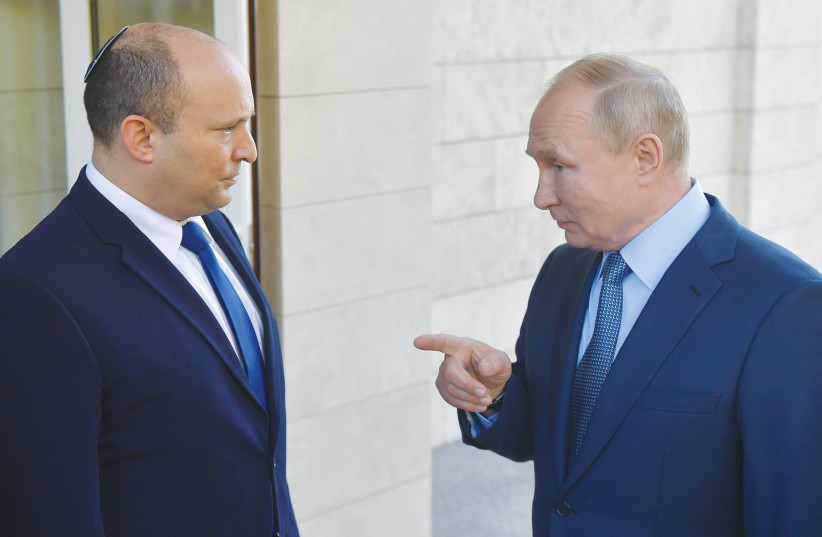For years, in the opposition, Yair Lapid criticized then-prime minister Benjamin Netanyahu for cozying up to authoritarian figures.
When he became foreign minister, Lapid spoke of the importance of Israel’s liberal democracy and values and said that he would emphasize them and strengthen relations with other countries that share those values.
In fact, just last week, when German Foreign Minister Annalena Baerbock visited Jerusalem, Lapid said to her: “It is not only the past that connects us, but the present as well.
"The alliance with Germany is one of Israel's most important alliances, "he said. "It is…a connection based on democratic and liberal values and a similar worldview. We hold a similar view on issues such as the climate, LGBT rights, the importance of the fight against all types of racism and bigotry, and the need to fight for democracy that has been under global attack in recent years.”
Another thing that Germany and Israel seem to have in common these days, which Lapid didn’t list: equivocation on the Russia-Ukraine conflict.
Russian President Vladimir Putin is exactly the kind of leader Lapid would speak out against when Netanyahu was running Israel’s foreign policy: Authoritarian, illiberal, nativist, homophobic. Climate change doesn't even register.

Plus, he has a hunger to expand Russia’s borders into other countries’ sovereign territory and a penchant for destabilizing Israel’s allies.
Yet, when it comes to Russia destabilizing and possibly invading Ukraine, a democracy trying very hard to stay that way, Israel - and Lapid - are making like Switzerland.
Asked earlier this week why Israel has not taken a side in the conflict, Lapid said: “I may be more careful than other foreign ministers, but I have a problem that they don’t: Russia and Ukraine have huge Jewish communities, so we need to be careful.
“Our stance is clear,” he said: “We need to prevent an armed confrontation between Russia and Ukraine… Israel is not involved in the Russia-Ukraine conflict, and therefore is behaving cautiously.”
In other words, Lapid is arguing that he traded in one ideal - solidarity between democracies - for another: Jewish unity and Israel’s sense of responsibility for the 50,000 Jews in Ukraine, 180,000 Jews in Russia, and millions of others in the Diaspora.
REALPOLITIK PROBABLY played as great a role in the decision, and probably an even greater one.
Lapid wasn’t asked why he criticizes illiberal figures like Hungary’s Viktor Orban or Poland’s Law and Justice Party, but not their apparent role model Putin – but one reason would certainly be Russia’s size, influence and military might in comparison to Hungary or Poland.
And that influence and military power are expressed right on Israel’s northern border: in Syria. The deconfliction mechanism between Jerusalem and Moscow - by which the former gives the latter a heads-up before striking Iranian forces there - is important for Israel’s national security.
Lapid talked like an idealist until he was confronted with harsh realities; sometimes, Israel needs good relations with countries that are not liberal democracies.
However, the time seems to be fast approaching when Lapid's ideals will need to outweigh short-term realpolitik.
When it comes to Ukraine, much of the world is splitting into two camps – which are, to a great extent, the same two camps in the world power competition between the US and China.
The liberal democratic West is with the US – even if its voice is more cacophonous and less harmonious than may be ideal – and that is the camp in which Israel, not just Lapid, wants to be.
Jerusalem knows that as good as its ties with Moscow may be and as much as relations with Beijing have improved over the past 30 years, they will never compare to the strategic alliance with Washington, which is built not only on interests, but on values.
Israel may be trying to have it both ways in the short term – and it seems to be working. Several diplomatic sources have said that America and Russia are not demanding that Jerusalem take a side - even though Kyiv is imploring it to do so.
But with the possibility of the first war in Europe in decades – and the certainty that Russia is sowing chaos and challenging the international order – Israel, which has always sought to send a moral message to the world against antisemitism and the dangers of authoritarian regimes, may very well have to make a choice soon.
And that choice will surely be to put Lapid's liberal democratic values at the fore and stand with the West and Israel’s greatest ally, the US.
